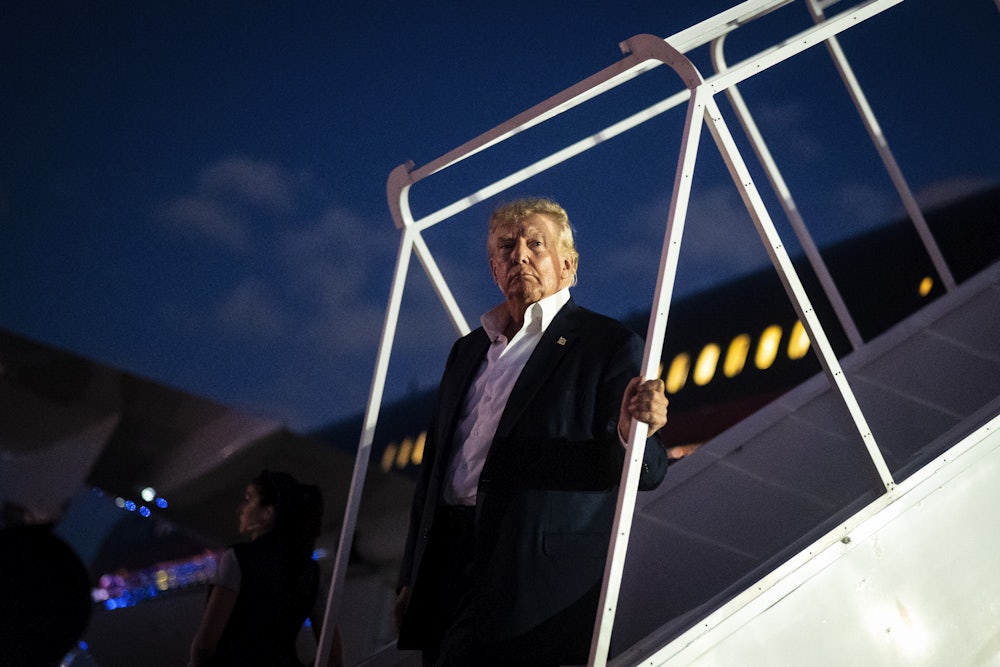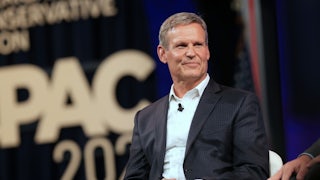Already there are a few patterns emerging about the 2024 presidential race. For one, some of the leading Republican aspirants are skipping this year’s Conservative Political Action Conference, which starts on Wednesday just outside of Washington. That absence just happens to coincide with CPAC honcho Matt Schlapp facing allegations of making sexual advances on another man. But there’s also the fact that it’s a bit of a lost cause for them to prostrate themselves at CPAC. That’s Donald Trump’s arena.
And then there’s another important factor. As these potential candidates start to officially jump into the 2024 presidential race, a pattern is emerging: mild criticism of Donald Trump. It’s grown from basically a whisper. Former Trump Cabinet officials are either running against him (Nikki Haley) or setting up their presidential bids to do so (Mike Pence, maybe Mike Pompeo). Former Republicans presidential candidates like Jeb Bush are clearly looking to nudge the party away from Trump by praising Ron DeSantis. Still other prominent Republicans (Paul Ryan) are vowing to boycott a Republican convention if Trump is the nominee. Additionally, there are serious indicators that Trump’s support is waning among the GOP electorate. And on top of all that, the Republican primary is already shaping up to be a crowded affair.
So you’d be forgiven for thinking that 45 could be stopped from getting the Republican presidential nomination again.
But privately, even the newest openly Trump-resistant Republicans—the ones who will pretty quickly say they want to “turn the page” or are looking at another GOPer to lead the party—are fretting that Trump might not be stopped again. They say that in a scenario where the party is splintered among several candidates, there’s just not much senior leaders, or really anybody, can do to prevent Trump from benefiting the most. “Look, Trump has a strong solid core of support that is not going anywhere, no matter what,” said Republican strategist Alice Stewart. “And that 30 to 35 percent of the core Republican base is not going anywhere.”
The prospect of this scenario has spurred a mixture of responses. Some Republicans, like Texas Senator Ted Cruz, have opted to just plain not run for president in the end, expecting the battle to eclipse Trump to be too difficult. Others are privately planning to run for president but will get out if it’s clear that their presence is really only benefiting Trump. There is also a group of Republican leaders who have been discussing whether to urge competing candidates to drop out of the race if it gets to a point where Trump is gaining too much ground, according to one Republican operative. The operative declined to name this group of Republicans.
“I think this time you’re going to have a much higher awareness of the problem of the divided field, and I would think what you’ll see is a little more leadership from other parts of the party if someone’s not catching on. The money will dry up faster, and people will have to get out,” Republican strategist David Kochel said. “If you’re a challenger to Trump, or if you’re someone who doesn’t want to see Trump become the nominee, you’re going to do what you can to make sure that we don’t repeat that again. Obviously, that’s something he wants and is certainly aware of … which is why he kind of welcomed [former U.N. Ambassador] Nikki Haley to the race without taking big shots at her.”
Another veteran Republican operative, when asked if there is anything that could stop Trump in a crowded primary, offered the most pessimistic response possible. “No,” the operative said. “This is looking exactly like it did in 2016.” There’s a “collective action problem,” the operative explained, because none of the major candidates, consultants, or donors will want to put their own self-interest aside. They are fully aware of the dynamics that help Trump, but they also think, “OK, well, I don’t want to die,” the operative said. “This is the same thing that happened in 2016.”
In 2016, Trump started out as a joke. The Huffington Post opted against putting coverage of Trump’s candidacy in its politics section. He seemed like a sideshow. Serious party leaders expected the media mogul to fizzle out after a few chaotic news cycles. The other candidates failed to recognize the threat Trump posed and assumed that if they fought hard for the non-Trump vote and also worked to appeal to his supporters, Trump would eventually drop out for some reason and that would be that.
In many ways, 2024 is not 2016. Trump now has a record of governing. His rivals in the Republican primary take the possibility of him getting the nomination far more seriously. He triggered an attempt to overthrow the outcome of the 2020 election. He may be indicted. So it’s not the same situation.
And yet the real problem for anyone who doesn’t want Trump to be president again is that key dynamics—an unwieldy primary field, a chunk of the GOP electorate supporting Trump—are shaping up to be eerily similar to 2016. Already RNC Chair Ronna McDaniel is trying to address the prospect of a fractured primary. She’s saying a loyalty pledge as a requirement to participate in debates is a surefire solution. But rank-and-file Republicans know this is a Band-Aid at best. Trump ignored similar moves before and ended up winning anyway. He’ll surely do that this time around too. Republicans may be saying otherwise publicly, but privately they know this and know there probably isn’t a thing they can do about it.






